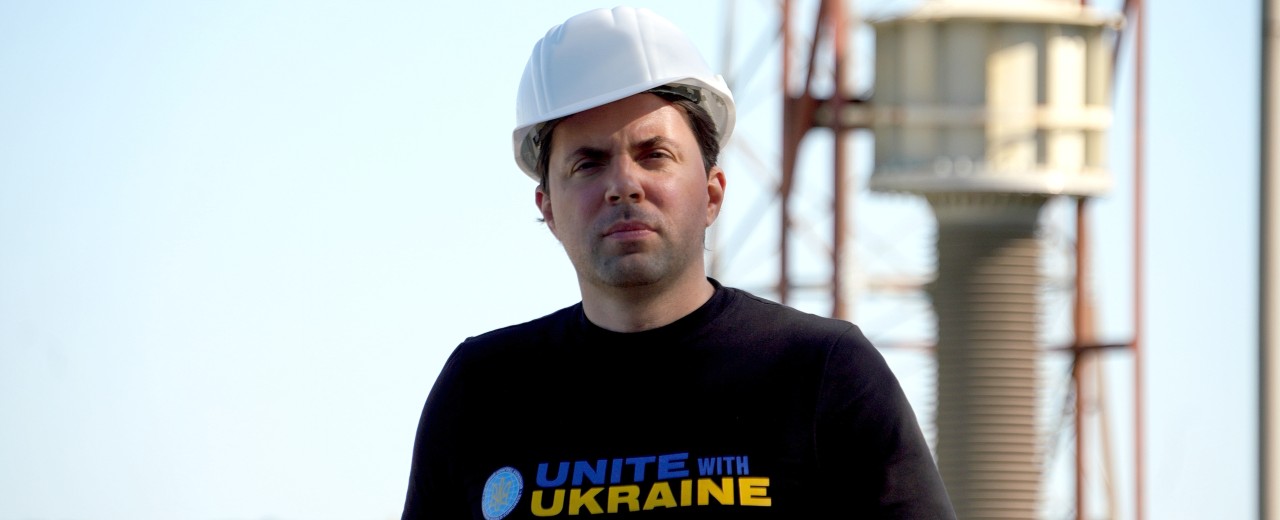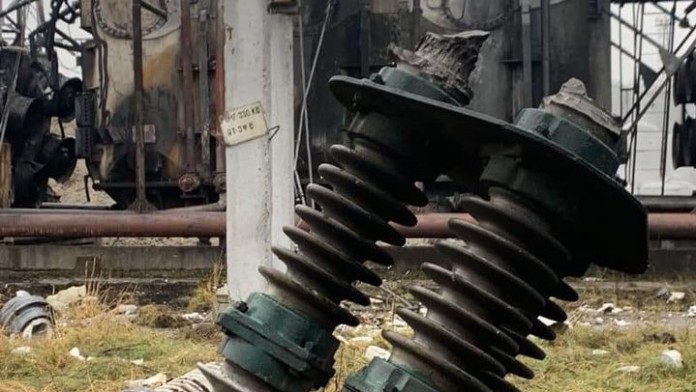Interview with Wolodimir Kudrytskyi
“It's a constant effort”The former CEO of Ukrenergo talks in an interview with Friederike Bauer about efforts to keep the lights on, the importance of the international donor community and that he would like to attract more private investments.
As of: April 2024

Let me first look back a little bit: Between October 2022 and February 2023 around 1.500 missiles and drones hit Ukrainian electricity facilities in one way or another. As a result almost half of the transmission grid and up to 60 % of the power generation plants were damaged or destroyed. After this heavy Russian offensive we created a miracle: We repaired 95 % of the grid before the next winter period started. Just to give you an idea of the scale we are talking about here. In normal years we install 10 autotransformers (equipment that enables the change of voltage during the electricity transmission from generation to consumers, editor´s note), which is more or less in line with our peers in Europe. In 2023 we installed 72 in one year. These big items of equipment are weighing more than 200 tons each, taking several trucks to transport them.
It took an enormous effort. We have very competent, professional and dedicated people here at Ukrenergo. If necessary they work 24/7. Altogether we managed to achieve repair works equivalent to one or two decades of grid development and construction during Soviet times. Even though the grid was heavily attacked by the Russians it took us less than twelve months to reconstruct it almost fully. I myself did not believe that we would be able to do this but we did. It was an organisational effort, a coordination effort, but mostly it was a heroic effort from our workers in the field.
We did until March when the next heavy Russian wave of attacks hit us. Until then customers had normal electricity supply. Unfortunately that has changed during March and April. Now we ask customers to save as much energy as possible, particularly in the evening. During those hours the deficit becomes so large that it cannot even be covered by imports from the European Union.
Exactly. The heating – that also depends on electricity to function – worked. The Ukrainian people did not have to freeze and they did not have to change their life habits due to electricity reasons for long periods. More importantly, the Ukrainian industry could operate during the winter uninterrupted. It did not have to stop due to power outages. That contributed to an economic growth of around 5 % in 2023. The situation changed in spring.
During the attacks in March and April 2024, Russians chose generation facilities as their main targets. Our thermal and hydropower plants were hit dozens of times, with repeated attacks happening again and again. Although the temperature is higher now and the heating season is over, we were deprived of a large share of high-manoeuvring capacities for balancing the system.
When our thermal and hydropower generation is either destroyed or severely damaged, Ukrenergo has limited tools to balance the system, especially during the peak consumption hours. Under these new conditions, we have to ask people to voluntarily restrict their electricity consumption in the morning and in the evening to avoid power outages. Sometimes, there is also a need to introduce restriction measures for industrial consumers. And this situation is critically undesirable from an economic viewpoint.
We from Ukrenergo work day and night to rebuild the grid. And we also try to increase protection where possible. I consider this to be absolutely critical. KfW is firmly supporting us in this. That makes and will hopefully make a tremendous difference. Our goal is to make the Ukrainian power system less endangered and more resilient in its operation.

Yes, we were: In 2022 we built a 100 kilometre transmission line and last year another one interconnecting with Poland. In Germany, for example, it can take 10 to 15 years to build a power line. In Ukraine we do that in one year. This was very important, not least because it ensures a good connection to the European Union which allows us to import 1,7 GW electricity from there – which amounts to almost two nuclear units. With Russian attacks having picked up again we need those electricity imports to keep the grid as stable as possible. We are, by the way, an integral part of the European power system. Something we also managed with international support.
Last year alone Ukraine commissioned about 600 MW of renewable energy installations. And even more importantly, we as a grid operator issued a record number of grid connections for better storage systems over the last ten months. Now that we are part of the European electricity system, our next big mission, apart from the ongoing repair work, is to transform and decarbonize our power system. We have nuclear, hydro and a very good wind and solar potential. Our intention is that in ten years from now we are almost carbon neutral. We will be working as fiercely on this as we have on the EU power integration.
Looking only at the new projects for Ukrenergo we are talking roughly about 300 to 400 million Euros.
This support is absolutely vital for us. Without the financing from KfW and other international donors it would have been impossible for us to survive the last two winters. KfW kindly provided us with additional financing during this full scale Russian war. However, it was also important what had happened before the invasion because the works performed during that time were critical to then maintain lines in the very important regions of Kharkiv, Dnipro and also in Zaporizhzhia. To sum it up: KfW plays a huge role in the resilience of the Ukrainian power grid. And I hope it will continue to play a huge role, not only helping us to prevail in this war but also to further modernise and transform the power system the way I described it.
I think people here regard Germany as one of our biggest friends in the world. The general perception is that a positive outcome for Ukraine is unimaginable without the active support of Germany. It is not only the biggest economy on the continent but also the biggest defender of democracy in this part of the world.
As I said, we are extremely grateful for the backing we received so far. Yet, in the future I would like to see our cooperation switch from support to facilitation mode. As a transmission system operator and a banking group, we should together try to open up new opportunities for investors in the Ukrainian power sector. That includes investments from Germany e.g. in energy storage facilities, wind or solar farms. And I mean that even before the war ends we should work hard to make investments flow despite the present conditions. Our past cooperation with KfW creates a perfect foundation for this and for future achievements. I am keen to start this new phase with KfW.
I have never stopped believing in us. It may require time and effort and sacrifices as well. We know it won´t be easy. But if you look at the whole Ukrainian history nothing, literally nothing was ever achieved easily by Ukraine. Instead, we will have to fight our way forward to freedom, independence and democracy.
Share page
To share the content of this page with your network, click on one of the icons below.
Note on data protection: When you share content, your personal data is transferred to the selected network.
Data protection
Alternatively, you can also copy the short link: https://www.kfw-entwicklungsbank.de/s/enzBzcci
Copy link Link copied